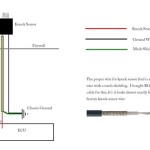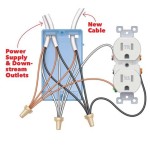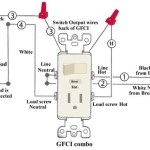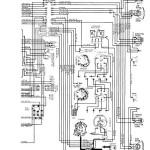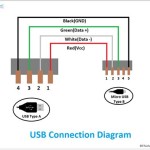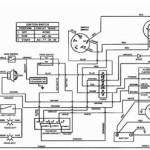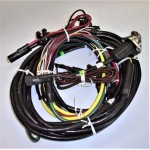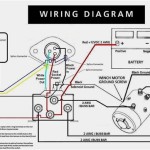RV trailer wiring refers to the electrical system that connects an RV (recreational vehicle) to a tow vehicle. It ensures the safe transmission of power, lights, and signals between the two vehicles. An example is the 7-pin connector, commonly used in North America, which handles functions like taillights, brake lights, turn signals, and auxiliary power.
Proper RV trailer wiring is crucial for safe towing, as it prevents electrical failures and accidents. Benefits include improved visibility, enhanced communication, and the ability to power appliances in the RV while driving. A key historical development occurred in the late 1940s with the introduction of the 4-pin flat connector, which set the foundation for modern trailer wiring standards.
This article explores the different types of RV trailer wiring, their components, and best practices for ensuring a safe and reliable connection. By understanding these aspects, you can ensure the proper functioning of your RV’s electrical system and enhance your towing experience.
The essential aspects of RV trailer wiring are crucial for ensuring the safety and reliability of your towing experience. These aspects encompass various dimensions, from the types of wiring to safety considerations and troubleshooting techniques.
- Types: 4-pin, 5-pin, 6-pin, 7-pin, and more
- Components: Wires, connectors, plugs, sockets
- Safety: Proper grounding, insulation, and weatherproofing
- Installation: DIY vs. professional
- Troubleshooting: Common issues and solutions
- Maintenance: Inspection, cleaning, and repairs
- Regulations: Local and national standards
- Advancements: Wireless and smart wiring systems
Understanding these aspects empowers you to make informed decisions about your RV’s electrical system, ensuring a seamless connection between your tow vehicle and RV. Proper wiring not only enhances safety but also improves communication, lighting, and the overall functionality of your RV. By paying attention to these key aspects, you can ensure a reliable and enjoyable towing experience.
Types
Understanding the different types of RV trailer wiring is pivotal in selecting the appropriate configuration for your tow vehicle and RV. The number of pins in the connector determines the number of functions it can support, ranging from basic lighting to advanced features like electric brakes and auxiliary power.
-
4-pin Connector:
The most basic type, commonly found on older trailers and tow vehicles. It handles essential functions like taillights, brake lights, and turn signals.
-
5-pin Connector:
Similar to the 4-pin connector, but with an additional wire for reverse lights, providing enhanced visibility when backing up.
-
6-pin Connector:
Introduces a dedicated wire for electric brakes, enabling safe and effective braking of the trailer.
-
7-pin Connector:
The most comprehensive type, commonly used in modern RV setups. It includes all the functions of the 6-pin connector, plus an additional wire for auxiliary power, allowing you to charge your RV’s battery while driving.
Choosing the correct type of RV trailer wiring is crucial for ensuring proper functionality and safety. By matching the capabilities of the connector to the electrical requirements of your RV and tow vehicle, you can optimize your towing experience, ensuring reliable communication and power supply.
Components
The components of RV trailer wiringwires, connectors, plugs, and socketsplay critical roles in establishing a reliable and functional electrical connection between the tow vehicle and the RV. These components work together to transmit power, lighting, and signals, ensuring the safety and functionality of the RV while towing.
Wires, the backbone of the wiring system, carry electrical signals and power throughout the system. Connectors, plugs, and sockets establish secure and weatherproof connections between different components, ensuring a stable electrical flow. Without these components, the RV’s electrical system would be incomplete, leading to potential hazards and malfunctions.
The importance of these components is evident in real-life examples. Loose connections or faulty wires can result in flickering lights, brake failure, or even electrical fires. Proper maintenance and regular inspection of these components can prevent such incidents, ensuring a safe and enjoyable towing experience.
Understanding the connection between these components and RV trailer wiring has practical applications. By comprehending the functions and proper usage of wires, connectors, plugs, and sockets, RV owners and enthusiasts can troubleshoot minor electrical issues, perform basic maintenance, and make informed decisions when upgrading or repairing their RV’s electrical system.
Safety
In RV trailer wiring, safety is paramount. Proper grounding, insulation, and weatherproofing form the cornerstone of a reliable and hazard-free electrical system, protecting users from electrical shocks, fires, and malfunctions.
-
Grounding:
Ensuring a proper electrical path to the ground, grounding prevents the accumulation of electrical charge on the RV’s frame, minimizing the risk of shocks and fires. -
Insulation:
Insulating wires and components prevents electrical leakage and short circuits, safeguarding the system from damage and enhancing its longevity. -
Weatherproofing:
Protecting electrical connections from moisture, dust, and other environmental factors, weatherproofing ensures reliable operation in all conditions, preventing corrosion and electrical failures.
Overlooking these safety aspects can lead to severe consequences. Unprotected wires may spark and ignite nearby materials, posing a fire hazard. Insufficient grounding can result in electrical shocks, while inadequate insulation can cause power loss or damage to electrical components. Weatherproofing protects the system from the elements, preventing malfunctions and ensuring a longer lifespan.
Installation
Installing RV trailer wiring correctly is crucial for electrical safety and functionality. Whether to undertake a DIY installation or hire a professional depends on several factors:
-
Complexity:
Complex wiring systems involving multiple connections, electrical components, and modifications may be best left to professionals.
-
Tools and Expertise:
Specialized tools and knowledge of electrical principles are necessary for proper installation. DIYers should possess these skills before attempting the task.
-
Time and Resources:
Professional installation can save time and resources compared to DIY, especially for large or complex systems.
-
Safety Concerns:
Electrical work carries inherent risks. Professionals are trained to handle these risks and ensure a safe installation, minimizing the possibility of electrical hazards.
When assessing DIY vs. professional installation, it’s essential to consider these factors. Hiring a qualified professional can provide peace of mind, ensure adherence to safety standards, and guarantee a reliable electrical system for your RV.
Troubleshooting
In the realm of RV trailer wiring, troubleshooting common issues is essential to ensure a reliable and safe electrical connection while towing. By understanding potential problems and their solutions, RV owners can proactively address electrical malfunctions, minimizing inconvenience and potential hazards.
-
Loose Connections:
Loose connections between the tow vehicle and RV, or within the wiring system itself, can disrupt electrical flow, causing lights to flicker, brakes to malfunction, or even complete loss of power. Tightening all connections securely can resolve these issues.
-
Faulty Wiring:
Damaged or frayed wires can lead to short circuits, power outages, or electrical fires. Inspecting wires regularly and replacing any damaged sections is crucial for maintaining a safe and functional wiring system.
-
Grounding Problems:
Improper grounding can cause electrical shocks, equipment malfunctions, and corrosion. Ensuring a proper electrical path to the ground through the RV’s frame and connecting to the tow vehicle’s grounding system is essential.
-
Water Damage:
Moisture can penetrate electrical connections, leading to corrosion, short circuits, and electrical failures. Inspecting and sealing all electrical connections, especially those exposed to the elements, can prevent water damage.
By understanding and addressing these common issues, RV owners can maintain a reliable electrical system for their RV trailer, ensuring a safe and enjoyable towing experience. Regular inspections, proactive maintenance, and prompt troubleshooting can prevent electrical problems and extend the lifespan of the wiring system.
Maintenance
In the realm of RV trailer wiring, maintenance plays a critical role in ensuring the system’s reliability, safety, and longevity. Regular inspection, cleaning, and repairs are essential components of a comprehensive maintenance plan, helping to prevent electrical issues, extend the lifespan of the wiring, and protect against potential hazards.
Neglecting maintenance can lead to a range of problems, including loose connections, corrosion, water damage, and faulty wiring. These issues can manifest in various ways, such as flickering lights, intermittent power supply, or complete electrical failure. By proactively addressing maintenance needs, RV owners can minimize the risk of these problems and ensure their wiring system remains in optimal condition.
Real-life examples underscore the importance of maintenance. Loose connections, if left unattended, can cause arcing and overheating, leading to electrical fires. Corrosion, caused by moisture and exposure to the elements, can weaken connections and damage wires, increasing the risk of electrical failures. Regular cleaning and inspection can identify and address these issues before they escalate into more severe problems.
Understanding the connection between maintenance and RV trailer wiring has practical applications. By incorporating regular maintenance into their RV care routine, owners can enjoy peace of mind, knowing that their electrical system is operating safely and efficiently. This proactive approach can prevent costly repairs, extend the lifespan of the wiring, and enhance the overall reliability of their RV.
Regulations
Within the realm of RV trailer wiring, regulations are a vital component ensuring the safety, reliability, and uniformity of electrical systems. These regulations, established by local and national authorities, provide a framework for manufacturers, installers, and users to adhere to, minimizing potential hazards and ensuring the proper functioning of RV electrical systems.
-
Wiring Standards:
These regulations specify the types of wires, connectors, and other components that can be used in RV trailer wiring. They ensure that the electrical system can handle the electrical load and prevent overheating, fires, and other hazards.
-
Connector Requirements:
Regulations also dictate the types of connectors that should be used to connect the RV trailer to the tow vehicle. These connectors must be compatible with the electrical systems of both vehicles and ensure a secure and weatherproof connection.
-
Grounding and Bonding:
Proper grounding and bonding are essential for safety in RV trailer wiring. Regulations specify the methods and materials to be used for grounding and bonding, ensuring that the electrical system is properly earthed and protected from electrical shocks.
-
Inspection and Maintenance:
Regular inspection and maintenance are crucial for the longevity and safety of RV trailer wiring. Regulations may outline the frequency and scope of inspections, as well as the qualifications of individuals who can perform them, ensuring that the electrical system is regularly checked and maintained.
These regulations, with their focus on safety, reliability, and uniformity, provide a solid foundation for the design, installation, and maintenance of RV trailer wiring systems. Adhering to these regulations helps prevent electrical hazards, ensures the proper functioning of electrical components, and contributes to the overall safety and enjoyment of RV travel.
Advancements
The advent of wireless and smart wiring systems has revolutionized the RV industry, transforming the way RVs are connected to tow vehicles. These systems eliminate the need for traditional wired connections, offering greater convenience, flexibility, and enhanced capabilities.
Wireless and smart wiring systems consist of wireless modules and sensors that communicate with each other and the tow vehicle’s computer system. They transmit data such as lighting status, brake activation, and battery levels, enabling real-time monitoring and control. This advanced technology provides several benefits over traditional wiring, including reduced installation complexity, easier troubleshooting, and the ability to integrate with other smart systems in the RV.
Real-life examples showcase the practical applications of wireless and smart wiring systems in RV trailer wiring. For instance, wireless backup cameras transmit video signals to the tow vehicle’s display, enhancing visibility and reducing blind spots while reversing. Smart brake controllers automatically adjust braking force based on the RV’s weight and road conditions, improving safety and stability. Additionally, wireless tire pressure monitoring systems provide real-time updates on tire pressure, allowing for early detection of potential problems and preventing blowouts.
Understanding the connection between wireless and smart wiring systems and RV trailer wiring empowers RV owners to make informed decisions about their electrical systems. By embracing these advancements, they can enjoy a more seamless, efficient, and safer towing experience. Moreover, these systems lay the foundation for future innovations, such as autonomous driving and remote monitoring, shaping the future of RV travel.










Related Posts

